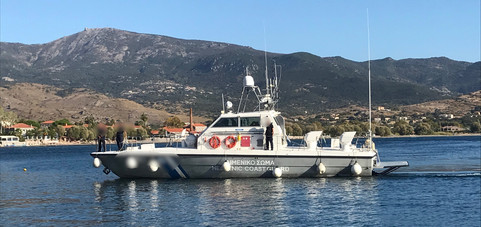When it comes to human rights of arriving asylum seekers to European shores, EU rules and procedures are being used as window dressing to feign accountability.
The EU system of checks and balance leans heavily on process, and articles of faith that others are saying and doing what they claim.
But it is a feedback loop that invariably allows violations of fundamental rights to go unpunished.
At stake is the credibility of a European Union and its border agency, Frontex. With an almost €6bn budget over the next few years and guards set to carry weapons, the agency is by far the the EU’s most powerful.
It is currently operating under the command of the Greek state in the Aegean Sea off the Greek islands near Turkey.
Frontex stepped up its operations in Greece after Turkey sent thousands of refugees and migrants to their mutual border early last year, sparking geo-political tensions.
Over a dozen allegations of illegal pushbacks of prospective asylum seekers surfaced soon afterwards, implicating Frontex.
The European Parliament and the Council, representing member states, are responsible for holding the Warsaw-based agency to account.
But any scrutiny is largely a public relations exercise and Frontex’s executive-director Fabrice Leggeri knows it.
He admitted as much in December, while speaking to members of the European Parliament.
Leggeri had followed procedures over internal reports of possible violations, known as “serious incident reports.”
The procedure required him to send letters to Greek authorities, demanding explanations and investigations into the allegations.
He had sent one in May to the Greek minister of maritime affairs, after a Frontex surveillance flight live-streamed a possible pushback.
He sent another such letter to the commander of the Hellenic Coast Guard after a Danish helicopter pilot in July witnessed a similar incident.
The Greeks denied any wrongdoing in response. And, for Leggeri, the case was closed.
In December, he told MEPs that “the system of the European Union” is designed in such a way that he cannot question the Greeks.
“If a national government, if a minister sends a letter to the director of an EU agency and says everything was according to the law, I cannot say ‘I don’t trust you’,” he said.
Feedback loop
The same message was this week repeated by the European Commission and the chair of the Frontex management board, Marko Gašperlin in what is a effectively feedback loop.
Gašperlin is a senior Slovenian police officer. As board chair, he is tasked to take “strategic decisions” on Frontex.
This includes launching an internal probe, known as the working group, into the pushback allegations in Greece.
The Greeks have denied all the allegations, claiming in some cases that migrants on boats turned back to Turkey of their own free will.
Asked how he validates Greek information, Gašperlin said he doesn’t.
“I am not sure that it would be a good basis for the work,” he said on Monday (15 March).
Patrik Engström, a Swedish member of the management board, also refused to cast doubts.
“I neither believe or disbelieve,” he said, when pressed on whether he can trust the Hellenic Coast Guard’s version of events.
On Tuesday (16 March), EU home affairs commissioner Ylva Johansson made similar assertions.
She said the agency is not implicated because Leggeri told her so over the phone late last year.
But Leggeri, in turn, got his information from the Greeks – which he cannot question. So to does Gašperlin.
Yet this line is taken at face value and repeated.
Window dressing
Johansson had also followed procedures, in what is window dressing feigning accountability.
In November, she demanded the management board convene an “extraordinary meeting” to probe the allegations.
The working group was then formed on 26 November, holding its first meeting, chaired by Gašperlin, in early December.
It then produced a preliminary report in January, highlighting procedural shortfalls in Frontex.
A final report was then issued in March but was unable to produce any definitive conclusion on the remaining five alleged pushbacks involving Frontex.
Four of those cases have since been cleared – but for reasons that have yet to be revealed.
“After the final report had been concluded, an additional four cases out of those five were actually cleared,” said Engström.
The results seek to spare the European Union reputational damage, at a time when Frontex’s powers continue to expand.
But in reality, they end up reinforcing a system of impunity of state institutions, whose political masters are largely supported by the EU.
For its part, the European Parliament declined to set up a more powerful inquiry committee into the agency.
Instead, they opted for the weaker scrutiny group, which aims to file a report and issue recommendations.
Leggeri, unsurprisingly, has welcomed it.
By NIKOLAJ NIELSEN
Source: EU Observer



